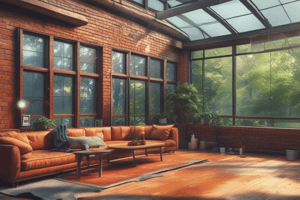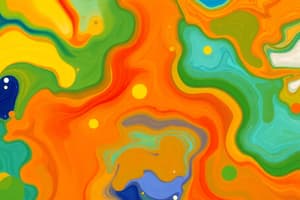Podcast
Questions and Answers
What is relative humidity?
What is relative humidity?
- The temperature at which air becomes saturated.
- The amount of moisture in the air.
- The ratio of the moisture in the air compared to the maximum amount of moisture that the air can hold at its current temperature. (correct)
- The total volume of water in a room.
What does an atomizing humidifier do?
What does an atomizing humidifier do?
Projects small water droplets into air either by mechanically flinging water or by forcing water through a nozzle.
What happens when humidity is too high in a building?
What happens when humidity is too high in a building?
Growth of mold, bacteria, and fungus, formation of condensation on cold surfaces, swelling of hygroscopic materials.
What is the purpose of a float switch in a humidifier?
What is the purpose of a float switch in a humidifier?
When a humidifier adds moisture to air already heated by a furnace, then the temperature of the air _____
When a humidifier adds moisture to air already heated by a furnace, then the temperature of the air _____
The Air Changes Per Hour (ACH) refers to replacing the entire volume of air in one hour.
The Air Changes Per Hour (ACH) refers to replacing the entire volume of air in one hour.
Which humidity range is considered comfortable for humans?
Which humidity range is considered comfortable for humans?
What type of humidifier uses its own heat source to create steam?
What type of humidifier uses its own heat source to create steam?
A humidifier's water feed line should be tapped into a building's _____
A humidifier's water feed line should be tapped into a building's _____
What is a desiccant?
What is a desiccant?
What is the function of a frost control element?
What is the function of a frost control element?
A portable humidifier is best for humidifying an entire building.
A portable humidifier is best for humidifying an entire building.
What is demineralized water?
What is demineralized water?
Dehumidifiers remove moisture from the air by maintaining a coil _____ of the air.
Dehumidifiers remove moisture from the air by maintaining a coil _____ of the air.
What does the term 'soft water' refer to?
What does the term 'soft water' refer to?
Flashcards are hidden until you start studying
Study Notes
Humidity and Humidifiers
- Relative Humidity: Ratio of moisture in the air compared to the maximum it can hold at the current temperature.
- Atomizing Humidifier: Projects small water droplets into the air using mechanical methods or nozzles.
- Evaporative Humidifier: Adds moisture through evaporation.
- Bypass Humidifier: Installed between supply and return plenums in central heating systems.
- Frost Control Element: Prevents airflow blockage by shutting off the compressor.
Effects of High Humidity
- Growth of mold, bacteria, and fungus can occur.
- Condensation forms on cold surfaces.
- Hygroscopic materials can swell due to excess moisture.
Humidity Control Devices
- Humidistat: Control device that responds to humidity levels.
- Float Switch: Shuts off the compressor to prevent condensation overflow.
- Desiccants: Chemicals used to absorb moisture from conditioned air.
Humidifier Operation
- When a humidifier adds moisture to pre-heated air, the temperature decreases slightly.
- Air Changes Per Hour (ACH) describes the complete air volume replacement in one hour.
- A solenoid valve in a humidifier operates when the furnace and blower are running.
Types of Humidifiers
- Vaporizing Humidifier: Uses its own heat source to create steam.
- Impeller Humidifier: Utilizes a spinning disk to fling water against a diffuser for atomization.
- Nozzle-Type Humidifier: Forces water through an orifice to produce a fine mist.
- Plate Humidifiers: Designed for low-capacity applications only.
- Rotating Disk Humidifier: Features spinning disks with shallow grooves to atomize water.
- Rotating Drum Humidifier: Contains a water pan and a drum with an absorbent sleeve.
- Under Duct Humidifier: Installed through the bottom of ductwork for central humidification.
Water Quality
- Demineralized Water: Treated to remove minerals.
- Soft Water: Low mineral content, natural water like rainwater.
- Medium Hard Water: Untreated water with 5 to 15 grains/gal. of mineral content.
- Softened Water: Ion exchange replaces minerals with sodium salts.
- Very Hard Water: Contains over 15 grains/gal. of mineral content.
Humidity and Comfort
- Ideal indoor relative humidity for human comfort is between 30% and 50%.
- Portable humidifiers are recommended for humidifying single rooms.
Additional Considerations
- Overflow outlet of whole house humidifiers must be at least 1" above open drain to prevent siphoning back into the potable water supply.
- Dehumidifiers function by maintaining coil temperatures below the dew point to remove moisture.
Studying That Suits You
Use AI to generate personalized quizzes and flashcards to suit your learning preferences.




